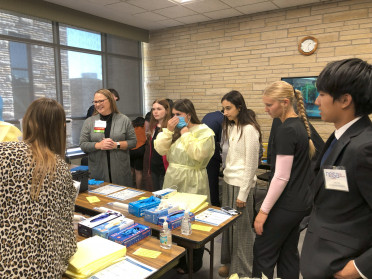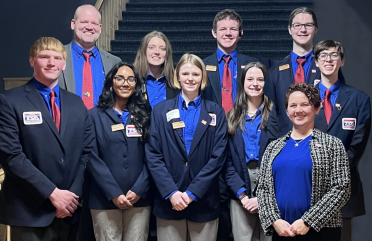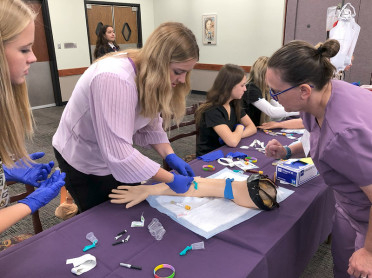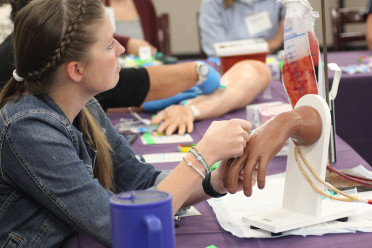Encourage Your Students to Take Advantage of Career and Technical Student Organizations
Starting in middle school, students often have an array of extracurricular activities to choose from — athletics, music, drama, robotics and much more. In the 2023-24 school year, 26,032 Kansas high school students — a record number — joined organizations designed to foster career exploration and skill development.
Those 26,000+ Kansas students are into something that could lead them to a high-demand career!
 Career and Technical Student Organizations (CTSOs) are student organizations that are aligned to career interests and offer a range of benefits and hands-on experiences in various fields, including business, health sciences, technology and more.
Career and Technical Student Organizations (CTSOs) are student organizations that are aligned to career interests and offer a range of benefits and hands-on experiences in various fields, including business, health sciences, technology and more.
These nationally recognized organizations are designed to enhance career and technical education (CTE) programs, but their benefits extend far beyond the curriculum. In addition to helping students learn more about career options, CTSOs encourage students to relate academics to the work world, compete in events individually or in teams, make contacts in their field who may become mentors or employers, hone leadership skills — and, of course, have fun.
Although not every school offers all CTSO options because of size or resource constraints, most Kansas schools provide a robust menu of CTSO options. The list below includes 2023-24 chapter and membership data.
- Business Professionals of America (BPA) focuses on careers in business management, information technology, finance and office administration. 32 chapters, 691 members.
- DECA prepares emerging leaders and entrepreneurs in marketing, finance, hospitality and management. 38 chapters, 1,377 members.
- Future Business Leaders of America (FBLA) aims to inspire and prepare students to become community-minded business leaders. 119 chapters, 2,807 members.
- Family, Career and Community Leaders of America (FCCLA) centers on personal growth and leadership development through family and consumer sciences education. 169 chapters, 3,355 members.
- FFA is dedicated to agricultural education and developing leadership in farming and agribusiness. 229 chapters, 13,508 members.
- HOSA provides a platform for students aiming for careers in the health industry. 59 chapters, 1,303 members.
- SkillsUSA serves students preparing for careers in trade, technical and skilled service occupations. 58 chapters, 2,648 members.
- Technology Student Association (TSA) promotes interest in technology, engineering and related fields. 24 chapters, 343 members.
Eye-Opening Experiences
 CTSOs have local chapter as well as state-level advisors. Ruth DeLange has served as state advisor for Kansas TSA since 2023, after serving as a chapter advisor and on the organization’s board of directors. She has taught technology and engineering CTE courses at middle and high school levels for 20 years and currently teaches manufacturing and construction classes at Derby High School. TSA promotes interest in technology, engineering and related fields and has around 25 chapters in Kansas with more than 340 members. Although TSA is one of the smaller CTSOs in our state, it offers big benefits to participants.
CTSOs have local chapter as well as state-level advisors. Ruth DeLange has served as state advisor for Kansas TSA since 2023, after serving as a chapter advisor and on the organization’s board of directors. She has taught technology and engineering CTE courses at middle and high school levels for 20 years and currently teaches manufacturing and construction classes at Derby High School. TSA promotes interest in technology, engineering and related fields and has around 25 chapters in Kansas with more than 340 members. Although TSA is one of the smaller CTSOs in our state, it offers big benefits to participants.
DeLange first became involved in Kansas TSA as an 8th grader, and that involvement opened her eyes to possibilities outside of her personal experience.
“TSA was my first experience with the world outside of my family, church and town. I learned there was a lot I didn’t know and that students my age could be passionate and involved in something much bigger than them,” DeLange said.
Her work as state advisor has helped ensure that more students learn the same lessons. Three events through the year offer hands-on team-building, leadership and personal growth activities. State officers plan events and conduct business meetings, and a statewide conference offers special interest sessions and official competitive events. Students who place in the top three in events qualify to take their projects to the national conference. At the June 2024 National TSA Conference in Orlando, Florida, a Kansas student was elected the organization’s national president, and five students placed in the top 10 nationally in events like CAD Architecture, Coding and System Control Tech.
DeLange said she has seen students develop maturity and poise in as they engage in public speaking, shine in their areas of skill or campaign for a state or national office. TSA holds students to high standards, and they rise to the occasion.
“I am amazed every year at the caliber of work that the students produce,” she said.
Important Benefits
Although their subject matter and individual offerings differ, most CTSOs offer a similar slate of conferences and competitions for students. One important benefit of CTSO involvement is that engagement translates into achievement through CTE. And CTE has a positive effect on Kansas students: The graduation rate for students concentrating in a CTE pathway is an impressive 99%. Of these students, 92% transition successfully to college, military service or employment related to their pathway within six months of graduation.
In addition to helping boost overall academic success, CTSO benefits include the following.
- Leadership development: Students engage in activities that foster leadership skills, such as managing projects, leading teams and public speaking. These experiences build confidence and prepare students for future leadership roles.
- Skill development through competitive events: Students apply classroom knowledge in real-world scenarios, promoting critical thinking and problem-solving abilities. Soft skills such as communication, time management and teamwork also come into play.
- Professional development: Workshops and conferences help students learn industry standards and expectations, enhancing their readiness for post-secondary education or immediate entry into the workforce.
- Community service: Most CTSOs emphasize the importance of giving back to the community, instilling a sense of social responsibility and empathy in students.
Powerful Growth
 One of the fastest-growing CTSOs in the state is HOSA, which is dedicated to future health professionals. Tina Garetson, state HOSA advisor, said membership doubled from October 2022 to December 2024, and current membership has grown to more than 1,900 students in 64 chapters. The organization has been responsive to students’ needs, and word has spread. Given the state’s need for healthcare workers, the organization’s growth comes at a good time.
One of the fastest-growing CTSOs in the state is HOSA, which is dedicated to future health professionals. Tina Garetson, state HOSA advisor, said membership doubled from October 2022 to December 2024, and current membership has grown to more than 1,900 students in 64 chapters. The organization has been responsive to students’ needs, and word has spread. Given the state’s need for healthcare workers, the organization’s growth comes at a good time.
HOSA’s activities include a menu of competitive events offered at conferences. Options include test-only events, multi-round events with a test component plus a presentation, and skills-based events. Some events require a team entry. In the CPR event, for example, students enter a room in pairs, receive a scenario and must respond appropriately. Forensic science events are offered in partnership with a Washburn professor who brings students and sets up a crime scene. Teams enter the room, review the crime scene, then write a case study analysis.
“Pretty much, if there’s a career they are interested in and want to explore, they have the opportunity to connect to an event, then compete and maybe go to nationals,” Garetson said.
 Conferences also provide opportunities to build soft skills. Students can attend sessions on compassionate listening in health care, caring for their own mental health after encountering difficult situations while working in health care, resume writing and more. They also become more comfortable with networking during expos attended by community colleges, universities, training programs and healthcare employers. The expos have become popular with students as they explore post-secondary options and find out more about Kansas healthcare career opportunities.
Conferences also provide opportunities to build soft skills. Students can attend sessions on compassionate listening in health care, caring for their own mental health after encountering difficult situations while working in health care, resume writing and more. They also become more comfortable with networking during expos attended by community colleges, universities, training programs and healthcare employers. The expos have become popular with students as they explore post-secondary options and find out more about Kansas healthcare career opportunities.
Garetson, who also works as the health career promotions program manager at the University of Kansas Medical Center Area Health Education Center in Pittsburg, Kansas, said she often hears “I wish we had HOSA at my school when I was there” from adults who attend conferences to network with students or to share their knowledge. She loves to see students learn — including likes and dislikes.
“Learning what they don’t like is as important as learning what they do. They don’t like seeing blood or don’t like needles — it’s important because we don’t want them to do something they don’t like for the rest of their lives,” Garetson said.
The learning opportunities help students flourish.
“I see the growth they can get from HOSA or another CTSO. It’s so powerful! I wish every school could have every CTSO because they bring the opportunity to learn and explore,” she said.
How You Can Support CTSO Involvement
Want to encourage your school to offer more CTSOs? Or need to help students to take advantage of CTSO opportunities? Here are some actions to take.
- Encourage exploration: Parents and teachers can help students explore various CTSOs to find one that aligns with their interests and career goals. Go over the list with students and ask them what sounds appealing.
- Identify options for your school: If your school is looking to add more CTSO options, find CTSO resources on the Kansas State Department of Education website. Find out how to start new chapters by exploring the organizations’ individual websites or contacting state advisors. Talk to your principal, counselor or activities director about how to help your school expand CTSO offerings.
- Provide resources: Schools can offer information sessions or activity fairs and hand out materials to educate students and parents about the benefits of CTSO participation. Consider adding an activity fair to your next parent-teacher conference, back-to-school night, or some other well-attended school event. Offer a virtual option at another time for those who can’t attend in person.
- Facilitate participation: Teachers can integrate CTSO activities into the curriculum and provide guidance to help students balance these activities with academic responsibilities and other extracurriculars.
- Identify partnerships: Investigate whether local or statewide organizations offer scholarships or partnerships to help defray any costs associated with CTSO memberships for students, or see if local businesses or business organizations such as your city’s Chamber of Commerce are interested in sponsoring a CTSO or providing speakers or activities as part of their workforce development efforts.




